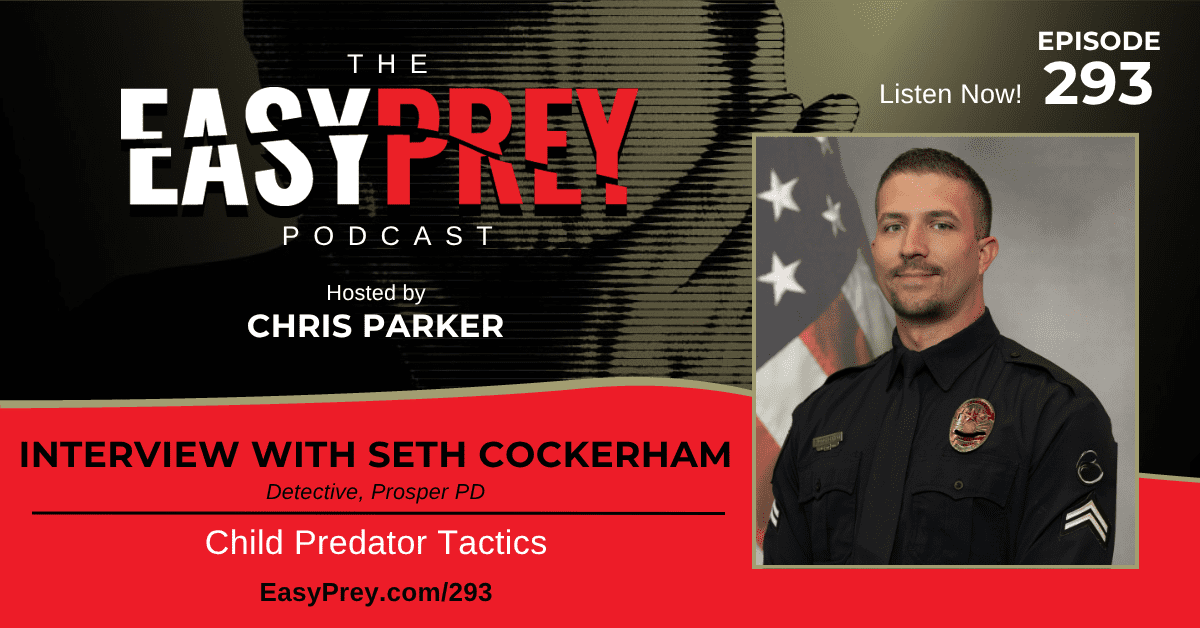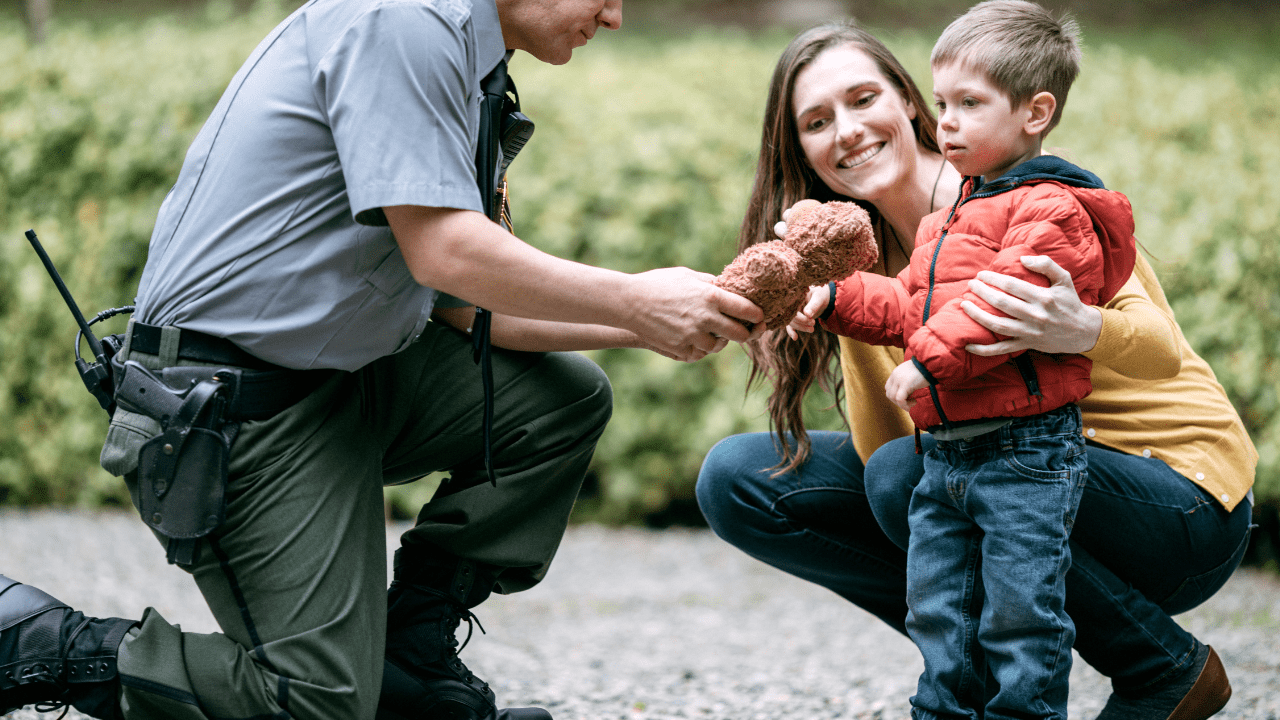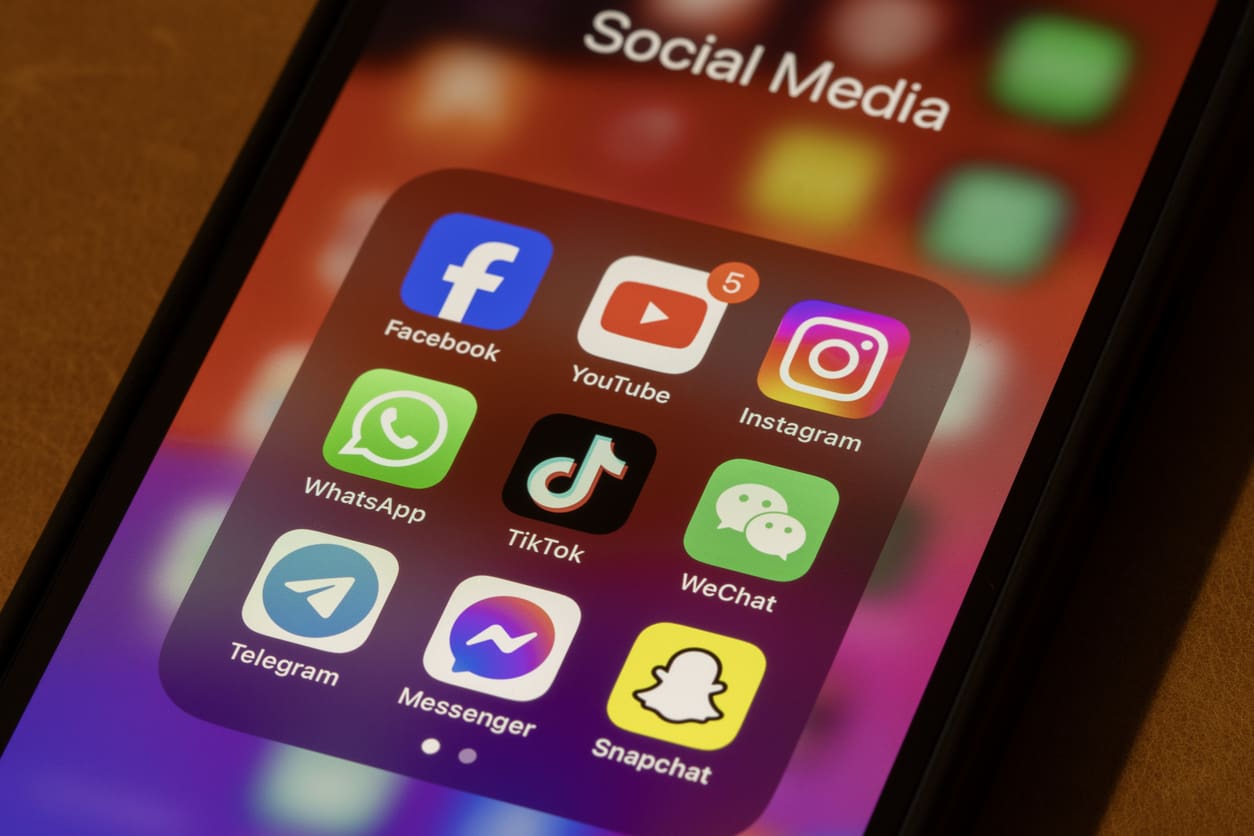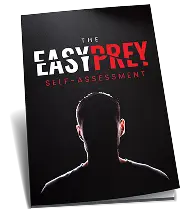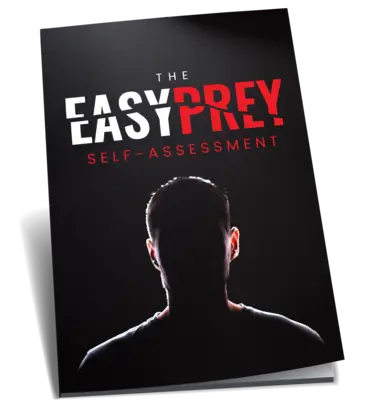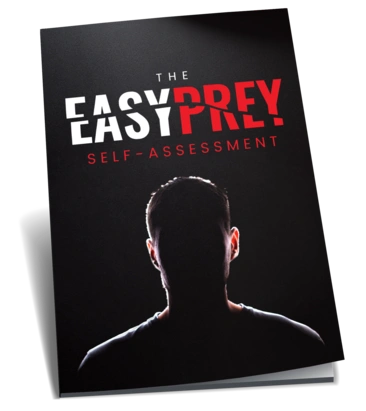Kids spend more time online than ever, and for the most part it feels normal. They’re gaming, watching videos, and chatting with friends. But hidden in those same spaces are adults who know how to pose as kids, build trust, and push conversations into dangerous territory. Parents might think it couldn’t happen to their child, yet detectives see how quickly an “innocent” interaction can turn into grooming or extortion.
That’s the world Detective Seth Cockerham works in every day. He’s been in law enforcement in Texas for close to a decade, and the last few years have been dedicated to investigating crimes against children. He talks about these cases with both the eye of an investigator and the heart of a parent, because he knows what it’s like to raise kids in a world where technology isn’t going away.
Seth explains how predators move kids off kid-friendly apps into spaces parents can’t easily monitor, what behaviors should make families pay attention, and why kids often keep things to themselves. He also shares what has worked in his own home like parental control tools, early conversations about boundaries, and making sure his daughters know they can come to him about anything. At the end of the day, his message is simple: if your child says something feels wrong, take it seriously.
“As long as there’s a chatting ability and they’re able to communicate with kids in any form or fashion, they’re going to be on that app.” - Seth Cockerham Share on XShow Notes:
- [01:07] Seth explains his path into law enforcement and how he moved into child crime investigations.
- [02:24] Why drowning and neglect cases motivated him to take a deeper role in protecting kids.
- [04:05] The personal impact of working child abuse cases and balancing it as a parent.
- [05:30] How predators go where kids are online, from YouTube to gaming platforms with chat features.
- [07:00] Grooming tactics predators use, often pretending to be the same age to build trust.
- [07:40] Grooming can escalate in hours or take weeks, with predators moving kids to apps like Snapchat.
- [10:39] AI filters sometimes detect inappropriate content, but predators still find ways around it.
- [11:52] Behavioral changes are often the first signs kids are being exploited or manipulated online.
- [14:10] Why some kids go to police instead of parents and how Seth builds trust with families.
- [16:47] Most child abuse cases involve someone the child already knows; online cases are often strangers.
- [18:20] International predators make prosecutions harder, especially in sextortion cases.
- [21:08] Managing families’ expectations when investigations take longer than TV shows portray.
- [23:55] Fastest time Seth has moved from a report to an arrest in an online case.
- [24:14] Common traits of perpetrators, often highly tech-savvy with strong knowledge of systems.
- [26:46] The parental control tools Seth uses at home, including the Bark phone for his kids.
- [29:30] How to reset boundaries with older kids and use resources like NetSmartz for education.
- [32:37] Seth’s advice to kids: never send selfies to strangers, don’t believe threats, tell a trusted adult.
- [33:39] His warning about sextortion: paying money never works, it only leads to more demands.
- [36:20] Resources for victims include counseling through advocacy centers and photo removal tools.
- [37:20] Seth’s key takeaway: listen to your kids and take their concerns seriously.
Thanks for joining us on Easy Prey. Be sure to subscribe to our podcast on iTunes and leave a nice review.
Links and Resources:
- Podcast Web Page
- Facebook Page
- whatismyipaddress.com
- Easy Prey on Instagram
- Easy Prey on Twitter
- Easy Prey on LinkedIn
- Easy Prey on YouTube
- Easy Prey on Pinterest
- Bark
- National Center for Missing and Exploited Children
- NetSmartz
Transcript:
Seth, thank you so much for coming on the podcast today.
Thank you, sir. I appreciate you for having me.
Looking forward to this. Can you give a little bit of background about who you are and what you do?
Yes, sir. My name is Seth Cockerham. I have been in law enforcement for going on 10 years, all in the great state of Texas. I started in one department, they hired me, put me through the police academy, and I got some good knowledge and foundation at that agency. I left there and went to my current agency.
I now investigate internet crimes against children and every other type of crime against a child, hands-on offenses, and sexual and physical abuse. I've been doing that for a little over two-and-a-half years, going on three years now. I've gotten my hands on pretty intense cases. It helped build my knowledge, and I've gone through tons of training for the subject as well.
I can imagine it's a difficult field to be in. How did you get involved in this specific field of law enforcement?
It goes back to working patrol, being able to investigate cases on a preliminary level, where you go out and you get dispatched to a drowning or a physical abuse case. On patrol, we just take the initial report, take the initial pictures, and then pretty much done with it. It goes off to a detective. Personally, I wanted to see more of what happens there and try and pursue those cases a little more than just that frontline level.
As soon as I got into a criminal investigation position, I went through tons of classes. My leadership actually came to me and said, “Hey, we noticed you've gone to a bunch of these classes, would you like to take those cases over?” I said, “Without a doubt, absolutely.” Here we are.
One of the ones that stuck to me that I felt passionate about seeing it through was drowning cases of kids. While most of them are accidents, there's some that are just neglect for not watching your kiddos, being intoxicated, and stuff like that. I wanted to see those parents held accountable for what happened to their kids.
Yes. That's definitely a really challenging field. Before we get started, I want to ask you about that because I think it's important. How do you manage, personally, the sensitivity of dealing with crimes against small children?
Actually, I was just speaking to a colleague about this, maybe last week. We discussed what makes me passionate about working the cases personally. I've got two little girls myself. I know the great childhood that they've been given, and they're blessed beyond measure whether they agree to it or not. They think they always need more, but I know that they've got everything that they'll ever need and want. I know they're taken care of. Whenever I see somebody else, some other little kid that's not being taken care of, and they're not being provided for, that gives me that motivation.
Dealing with those cases, I try to relate myself to them as if that were my kid, what I would want for them. At the end of the day, whenever those cases stick to you and you go home and you see your beautiful family, you're just thankful for what you've got and thankful that you're able to take care of your kids. Just having somebody to talk to instead of trying to hold on all that weight yourself, that's a lot to carry. You got to express.
Yeah. I can imagine that's particularly difficult. I know that you haven't been in this field for 20 or 30 years, but have you seen a shift towards more online crimes against children?
Yes. I will say even with the knowledge I have within a little over two-and-a-half years, I feel like everything changes, all these platforms where kids now have access to because as technology grows, the more technology babysits the kids at home. They're watching YouTube, they're playing on all these different gaming platforms where they have the ability to chat with their friends, so they think. It turns into being a 30 or 40-year-old man who's trying to take advantage of them. These people know that, so they go to where the kids are. There's more kids, I feel like, online now than there's ever been.
Yeah. Let's talk about that. Is there any limit to what apps and games these people won't go to?
If there's a limit, I haven't found it. As long as there's a chatting ability and they're able to communicate with kids in any form or fashion, they're going to be on that app. -Seth Cockerham Share on XIf there's a limit, I haven't found it. As long as there's a chatting ability and they're able to communicate with kids in any form or fashion, they're going to be on that app. I've seen apps that were designed just for kids to get on and dress up to their little characters and compete with other kids, how they dress other characters, but there was a chat option. I've seen kids get exposed on there as well even as young as the age of eight years old.
That's crazy awful. I was going to ask you, how young are some of the youngest kids that are targeted? Basically, it sounds like there's no lower limit.
There's not. The youngest that I personally worked the case for was eight years old. In that case, I found other kids who were younger than that that just had seemed to have access to their parents' devices. As long as the kid's able to be online, they can be victimized.
As long as the kid's able to be online, they can be victimized. -Seth Cockerham Share on XOK. Let's try to take a step back and not go too deep in that specific aspect of it. We talked about how the predators are really finding the kids basically anywhere that they can chat. Is that the most common mechanism within a game?
Yes. Chatting options are a big red flag for kids that are in a certain age and they're not educated on what can happen on those chats, yeah.
Got you. What are some of the tactics that the predators are starting to use when they're first meeting the kids in the game and starting to groom them?
A lot of them, they will interact with them as if they're 10 or 11 years old and just acting like they're the same age. They build that rapport with the kid, see what they're into, and then they'll feed off of that. “I like playing softball.” “Oh, me too.” And then go from there.
That's creepy.
It is.
How long does this grooming process take? Are they spending weeks and months getting to know the kids before they're trying to lure them? Are they engaging in inappropriate behavior within hours?
Typically, I would say it can be as soon as just hours because some kids just feel happy that they made a friend. It can take weeks depending on how off that kid is about talking with these people or how comfortable those predators feel about their relationship with that kid. I've worked on where it's taken two to three days. They talk them onto other platforms and they'll go from there.
Is that one of the common trends? I know that with adults being scammed or being taken advantage of, it will often start on a dating platform or a social media site, and then they'll switch to Telegram, WhatsApp, Signal, or something like that. I assume because the kids probably don't have access to some of these more advanced messaging apps, are they taking them to other games to talk or trying to circumvent the communications in other ways?
Yes, absolutely. That's what they do. I'll just give you an example, like Roblox. That's one that's in the news right now, and they're getting sued constantly. They will start their chats on Roblox, and then they'll switch over to whatever. Almost every teenager has a Snapchat, and they will go over to there or Instagram and they'll continue their chats there because it's harder to trace a chat on Snapchat than it is to be on Roblox, because supposedly they delete almost immediately. They're not always gone, but a lot of these people think that as soon as they delete those messages, their parents can't find them. Most of the time that's true, but fortunately, we in law enforcement can find those messages.
Yeah. Are there other apps like Snapchat that have disappearing messages that parents should be maybe more concerned about because that type of communication can disappear?
Yeah. A big one is an app called Session. To me, I don't know what else it's used for aside from illegal activities, but it's one of those you can turn on in your conversation that messages will delete after 24 hours. Once they're gone, they're pretty hard to recover.
Most often they're staying within just moving from one game to another game, that thing.
Once you go from that initial point of contact through whatever that chatting option was, that's almost a guarantee that they're going to take that conversation to another platform just to make it more difficult for the parents to be able to find that conversation.
Once you go from that initial point of contact through whatever that chatting option was, that's almost a guarantee that they're going to take that conversation to another platform just to make it more difficult for the parents to… Share on XIs it also part that they know, maybe not Roblox, but at some point the platform will detect, “Hey, this seems a little fishy; we need to stop this interaction”?
Yeah, some of them will. Some of them will pick up inappropriate content because they have AI filters and stuff that say, “Oh, I'm only 14 and you're talking to me in this way.” It will flag them and it will report to the national center.
Got you. I guess the question is, OK, this is pretty scary in terms of the kids playing games that are age-appropriate, and someone else who is not age-appropriate is interacting with them. How would parents and guardians know what to look for?
A lot of what we see is if it's going to be a quick, like a sextortion case, typically those show rather quick. In my experience with these cases, usually up to maybe about 20 minutes is whenever the kid really starts feeling helpless. Sometimes, they'll reach out to their family, but they will start changing their behaviors. Feeling ashamed, nervous, or just angry, upset that something's going on to them and they feel trapped. I've even had kids call the police department reach out and say, “Hey, this person is trying to take advantage of me.” Some of these kids all react a little differently, but for the most part, I would say that they changed their behaviors and they seem a little more closed off.
That's pretty neat that some kids have the mindset of real life saying, “This is wrong, and I need to contact law enforcement.”
Yeah. It's surprising even at young ages that they know this isn't OK. “I feel dirty for what's going on here.”
Yeah. This is the wrong question to ask, I apologize. Is it because they don't trust their parents, they don't have a good relationship with parents, or they just felt like, “Well, this is law enforcement and that's what you're supposed to do”?
Some parents teach their kids to call the police if they need them. That's why you've heard calls in the past where kids will call the police to help with a math problem because if this is a problem, they need help. A lot of parents do talk to their kids about, “Hey, police are here to take care of us and to help us.” Unfortunately, you're right on the dot with some of them. Some of them don't want to talk to their parents about it because they're afraid they're going to get in trouble and that they won't listen to them.
I've seen that. I've tried to go help kids before, and parents just don't like the police. I will just annoy that parent until I become a nuisance that they're like, “All right, do whatever you need to do.” At the end of the day, we're there to take care of the kids.
What are some of the things that you do to build rapport with the parents and the kids so that you can have a better understanding of what's happening?
I am very passionate about working crimes against children, and I relay that in every form or fashion that I can. I'll let them know, aside from being a detective, I'm a parent. I know how valuable my kids' life is and how valuable… Share on XI am very passionate about working crimes against children, and I relay that in every form or fashion that I can. I'll let them know, aside from being a detective, I'm a parent. I know how valuable my kids' life is and how valuable their future is. Above any other interaction that families potentially have with the police, I can assure them that my interaction with them is going to be a lot different. I give them my work cell phone number. Some people don't like to talk on the phone, so we'll text. Just trying to get more comfortable with them to the point that they're OK, they're opening up, and they're coming to talk to me. Any form or fashion that I can build that relationship, I'm doing it.
On the flip side of that, I'm not a parent, so I can imagine that there's this balance of, “OK, I want my kids to be safe, but I also don't want to make them afraid of the world.” Where's that balance of determining age-appropriate conversations and empowering the kids to be open and talk about things when they run across them?
I've got one kid that's under the age of 10, and I've got one that's 10. Some of those discussions can seem to be a little awkward at times. Parents want to avoid those conversations because they don't feel prepared to have those discussions with their kids. I think if you start them off from an early age and just let them know from what safe touches are to not OK, not safe touches are, that will open up that doorway for communication for years to come to where they feel that it's not going to be awkward to talk to you about things.
You don't have to go to your kid who's five or six and say, “Hey, let me teach you about people who are going to touch you in these areas.” It's simple as just saying, “These are your safe spots. Nobody should ever see them aside from me or a doctor, if somebody's trying to wash you or take care of you.” Aside from that, those conversations can be broken down into more simple things instead of making it an awkward conversation.
Yeah. When I was brought up, it was all about stranger danger, and then we realized that most crimes against kids are not done by strangers. Is the new teaching kids is trusting their instincts and watching out for the people that make you go yuck?
Yeah. Like what you were saying there, whenever it comes to sex offenses of children, there's this statistic out there from a study that goes to show that 93% of kids who were abused knew their perpetrator. I think 59% of that was family members, and then the other portion was close friends and family. There's only 7% chance based on this study that they're going to be victimized by a stranger. Just letting them know, “Go with your gut feeling, basically. If you don't feel safe, come tell me,” and then making sure that parents realize they need to listen to their kids. When they hear something, don't take it for what it is. Push it a little further and figure out the root cause of that.
I assume it's the exact opposite with internet crimes.
For perpetrators and stuff?
Yeah.
Yeah. From my experience, almost every one of those are somebody they met online.
Are the kids specifically targeted, like, “I know that it's Susie at this school in my community”? Or is it that these perpetrators are just trolling for any kid anywhere?
That is it. I'm not going to say that there's not some targeted attacks out there, but the majority are just fishing. They get on where they know the kids are. Instead of being creepy at a playground waiting for a kid, now they get into their computers and their phones. They can see where this is going to go, just throw bait out there, and see who bites.
Does that make it more challenging? In real-life crime, you have a much smaller pool of people to work with. When it's an internet crime, this could be someone anywhere in the world.
It does. If we run into an issue where the suspect is over in Nigeria or somewhere like that, those places don't really take our court orders and run with them. Most of the time, we'll reject them. Vice versa, I've actually had somewhere they did adhere to them. They were like, “Yeah, we'll give you that information that you need.”
Are most of the perpetrators in the cases that you've worked actually inside the United States?
Whenever it comes to online solicitation and stuff and sextortion?
Yeah.
The majority of them that I've worked for sextortion are not in the United States. I've had a handful that are, but the majority are not.
Does that significantly hamper your ability to prosecute?
Yes, it absolutely does. I try and explain to the family members I'm going to do everything I can, but at the end of the day, if they're beyond my reach, all we can do is try to educate your kid to not let anything like this happen to them again and advocate for other kids to be aware of what happens.
Is that the challenge in that if you have, I don't want to say necessarily a low-solve rate on the crime, but if people don't hear like, “Oh, yeah, 99% of these people end up in jail,” does that dissuade people from reporting it? If they do report it, does it put them in a hopeless position?
Yeah, I've had several of them tell me, they’re like, “I feel like you all can't really do anything about this.” I'm just upfront and honest with them. I say, “In my experience in working these cases, the majority show up out of the United States.” I always tell them, “But there is a chance because I've had people arrested all over the country for doing the same thing.” It's hit or miss, but I do let them know from the get-go, this may not go the way we want.
Does that being upfront with them generally help people to be more participatory in the process?
Yes. It makes them more understanding instead of thinking that it's going to be something like a crime scene show where I solve it in four-to-five minutes. I don't ever set anything about it for false hope. I always tell them, “This is what I expect our investigation to look like, and either one of these outcomes could be it.” We don't set the standard too high and put their hopes up there that we're going to get this person, but I do let them know it's always a possibility and we're going to try to do that.
Is that some of the challenge in working in the cases with the expectation from the victims of it's going to happen like it happens in FBI or CSI and that, “Hey, I could sit down in front of a computer in five minutes to figure out where this dude is”?
Yeah. In some cases, I can figure out where they're at pretty quick. Whenever it comes to online cases, we're looking at several court orders before we can get anything concrete to say, “This is where they're at.” Whenever it comes to hands-on offenses, I've had to tell parents, “You've got to give us a little time because this DNA that we have, sending it to the lab isn't only going to take an hour. It could take months or weeks; at the very least, weeks.”
Is that discouraging for you, or is it just like, “Well, I know this is how long it takes, so I can manage my own expectations”? Or does that get you down sometimes as well?
Whenever it's a big case and I know that it's taken a toll on the family, obviously I want to help them as quick as possible. I let them know, even though it may take a while for labs to come back or whatever else we're waiting to come back—subpoenas, stuff like that—no matter how long we wait, I'm going to remain communicating with them. I tell them, “If you feel like you've gone a little bit and you haven't heard from me, call me or text me, and then I will let you know what the update is.” For the most part, I don't really feel discouraged by it, but I do wish that sometimes I could help a little quicker than what the process is sometimes.
Yeah. What is the fastest time from a report of an internet crime against a child incident to an arrest that you've had?
Yeah, that's a good question. I feel like the fastest internet crime against a child is about two weeks.
That's pretty impressive. From my perspective, I was thinking months would be the case, but two weeks is pretty crazy fast.
If I can get a good IP address to return, do surveillance on the house, figure out who's all there, and get my search warrant and everything done, I would say within a month is pretty typical, but it just varies really. If I've got a very cooperative suspect house that they let me come in and just initiate normal conversation, they don't know what I'm doing, I can build it pretty quick.
Do you think they know right away why you're there?
No. I'm not going to say I lie to people, but I have a little freaky way of getting into the house, having that open communication, or I guess having a poker face about why I'm there. “Hey, I heard your dog got out. It was chasing somebody down the street, and I talked to him.” From there we just open discussion, figure out a little bit about the background and who all lives in the home, and then you can get a good feel for everybody that way.
I probably shouldn't ask this question, but is there any generalization about the perpetrators that you've come across?
The majority are very techie. A lot of them have a background in technology to where they feel like they are doing everything they can to make sure it doesn't get detected. -Seth Cockerham Share on XThe majority are very techie. A lot of them have a background in technology to where they feel like they are doing everything they can to make sure it doesn't get detected. With technology, how it is and all these service providers, they report very well now. If it's out there, more than likely it's going to get detected when they download it, share it, or whatever they do with it.
Got you. Are there any particular cases that really stand out in your mind and shape how you view online safety without going into details that are not appropriate to go into? Are there any cases that stand out of like, “This has changed the way I look at things”?
Yes. I would say one of those would be working with younger kids because kids are so innocent. They get on YouTube, and they're just watching things because it's fun, it's entertaining, and they like that. But once they show that they can use YouTube responsibly, they get access to other apps because parents maybe don't use parental controls. I just see how fast small children can be taken advantage of and forced to do things or threatened if they don't do something. I just see that negative effect that it has on them, and then it makes me very cautious. As a parent, I'm very restrictive about what my kids have access to, but I still want them to learn how to use technology because it's not going away, and I want them to grow up knowing how to use it and to leverage it for their future.
Are there parental control apps, monitoring apps that you use with your kids or that you recommend when you're talking to people?
Absolutely. Even before I started working this type of work, one of my detective partners, knowing I have kids, he was like, “Have you looked at Bark?” I'm sure you're probably familiar with what Bark is. I'm sure you've heard of it. I started looking into it. At that time, my kids were still really little, so I was like, “Ah, they don't really need any devices right now.”
Now that they're older, my oldest one, that's all we use. We use the Bark phone. There are reasons for that. I know where she's at. I can limit what she has access to. It was one of the ones that going to all my trainings that I've gone to, at the end of them, they're given resources for parental controls and it's always in the top three. To me, it seemed like a good idea. I personally heard good feedback from people I work with and it's been great for me.
Got you. What do you recommend for parents in terms of, if they haven't been diligent about this up to their particular age with their kids and they're hearing this and going, “Gosh, I really should do something. I should change what my kids are doing,” how do you recommend those conversations go in terms of, OK, we didn't have any controls in place and, “Hey, Johnny, we're now going to put controls in place”?
Kids may not understand that immediately. I think sitting down and just having that conversation, showing them some stuff like the National Center for Missing Exploited Children, their net smarts stuff that they have, they have stuff for little kids that they can watch and pick up some things about online safety there. They have stuff for teenagers. They got stuff for parents. Sitting down and just watching those things with your kids and explaining, “This is what this means, this is why we have to be safe on here, and this is why I'm going to implement parental controls on your device just to keep you safe. I'm not trying to ruin your childhood, I'm not trying to interfere, I'm not trying to invade your privacy, or anything like that. My job as a parent is just to keep you safe.”
Whenever we got that Bark phone for my kid, she at first was like, “Whoa, I don't want you just watching everything I do.” I'm like, “I'm not doing that. I'm making sure you're taken care of and that you're safe,” and she loves it. She doesn't question me on anything now. It's like, all right. She took to it pretty quick.
Yeah. I can imagine the challenge and the conversations between I want to help you, but I also don't want to break your trust and trying to have those things be balanced in a way that's healthy for the kid.
I feel like a lot of parents feel like they're invading their kids' privacy, and sometimes I think it's just a barrier that you have to push through mentally as a parent and just know as much as you want to be your kid's friend,… Share on XYeah. I feel like a lot of parents feel like they're invading their kids' privacy, and sometimes I think it's just a barrier that you have to push through mentally as a parent and just know as much as you want to be your kid's friend, the most important thing for you to do is be a parent to them. If you're not going to protect them and you're not going to educate them on what can happen, somebody else is going to do it, or they're going to take advantage of them before they're educated.
Are there things that parents think that are useful in protecting their kids? I'm not necessarily talking brands, but tools that parents think that are useful for protecting the kids that really aren't. Let's just say, “I'm sure the platform's going to protect my kid.”
Yeah. I do hear that because there's an age verification that, “You can't be over this age to use this application.” OK, so what happens whenever that predator has a kid, you know it's their own child, and they use their face to say, “Oh, yeah, facial recognition that shows that this kid is about 10 years old, so they can use this app.” Now they have access to the app and they can communicate with their kid. Just because there's a safety measure doesn't really mean anything. Anybody can bypass that.
A lot of parents think, “I'm just going to take their phone. I'm going to look through it once a week.” That can be helpful, but most of the time if it's a kid and they know that there's stuff on there they don't want the parents to see, they'll delete it. By the time you get it, you may not actually see what was on there.
I assume that would be true for most of the in-app parental controls that the kids are smart enough to figure out how to turn those on and off when it suits themselves.
Yeah, there are those. That's why we got the Bark phone instead of just the app. Like I said, I've heard great things about the app, and I've heard good things about other parental controls, but on the Bark phone itself, my kid can't deactivate that. It's in the SIM card, it's in the operating system of that phone. They can't bypass it and they can't delete the messages. They can't download and they can't talk to somebody unless I've approved that contact. I don't have to worry about her deleting things before I can see them.
If you don't feel comfortable with it, do not do it. -Seth Cockerham Share on XGot you. What advice would you have for kids? Parents need to watch out for weird behaviors. “Gosh, something's off about my child; I need to have a conversation.” What should the kids be doing when talking with their friends, and how should they respond if they think something's up?
If a kid is talking to somebody and they say, “Hey, send me a selfie of yourself,” and they don't know this person at all, they've never seen them, don't even send a selfie. As innocent as that is, don't send a selfie. Even if it escalates past then, like, “Hey, send me this or I'm going to come to your house and I'm going to destroy your whole family,” don't believe it. It's just a threat and it's not going to happen.
If somebody's talking to you in those ways and you know this shouldn't be happening, tell somebody, tell your teacher, your principal, your mom, your dad, whoever is a trusted adult in that kid's life, they need to go to them and say, “Somebody is talking to me in a way they shouldn't. Somebody asked me for a picture of me, and I've never met this person. I don't feel comfortable with it.” If you don't feel comfortable with it, do not do it.
Got you. For older kids in particular, those where sextortion might be a little bit more at play, what advice do you give in those situations? There's the fear of, “Hey, I'm going to distribute this everywhere. I'm going to send this to everybody that's in your contact list.” Whether they can or can't is not the issue, but there's a threat of significant embarrassment amongst their peers, what do you recommend for teens in that space?
If they've already gotten to that point, they've already sent that nude photo, and they're threatening to send it out to everybody on their friends list or send it out to their school admin, all these people, they're going to start asking for money and they're going to say, “Hey, send me $300 or $400.” They can go send that $300 or $400, but it's not going to stop. They're going to say, “All right, now that you sent me that, I need a $250 deletion fee.” “OK, I sent you that, but then now I want this.” It's going to continue.
Ultimately, the picture's either going to come out or it's not. Don't pay. Do not pay because if they're going to send that picture out whether you pay or not, that picture's still going to go out there. At some point you're going to run out of money and that person's going to say, “All right, I'm sending it.” All you're doing is draining your bank account in hopes that something doesn't come out that, like I said, ultimately will come out.
Do most of them ultimately get distributed?
I have had some that actually did not, but the majority got sent to close friends or family, the parents, stuff like that because they will post them. They'll create little wanted posters of these kids with their nude photo on it saying, calling them a child molester and all these different things, just trying to embarrass them. Unfortunately, it gets to a lot of kids and they will actually commit suicide. I hate that it happens. I hope that if any kid watches this, they know that's not the answer. Talk to a trusted adult, but don't send the money.
Are there resources for kids who have been victimized by this?
Yes. Whenever I have a case with a kid who has been through this, we use our local children's advocacy centers, which is a nonprofit. The therapy services, counseling, and all of that stuff for those kids, it's all free. There are resources out there and it's confidential that nobody knows. We don't go and tell everybody that, “Oh, this person's going to counseling.” Also, if they have that same picture that they sent, they can upload it. Top over my head, it slipped my mind, but I think it's called Take It Down. It's from the National Center for Missing Exploited Children. They can upload that photo, it will find it on social media, and it will delete it from there.
As we wrap up here, I know that you're not looking for people to contact you directly. What's a key takeaway parents should walk away with, and where can people find additional resources if they're looking for help to keep their children safe online?
I would say a key takeaway is listen to your kids. If they tell you, “Hey, I don't want to go see grandpa anymore because when he hugs me, he makes me uncomfortable,” don't laugh it off. Don't say, “Oh, you'll get over it.” Ask, “Why? How does he hug you?” Ask intentional questions and be real about it. That kid more than likely wants to tell you, and they're just afraid that they're going to get in trouble or they're embarrassed. Listen to your kids. In all aspects of anything they do, listen to your kids.
Listen to your kids. In all aspects of anything they do, listen to your kids. -Seth Cockerham Share on XIf they're looking for more resources, like I said, the National Center for Missing Exploited Children, they have net smarts. It's got everything for a family, parents to kiddos, on education, on online safety, safe touches, and stuff like that. Also, the FBI have on their website different resources for knowing what sextortion is, how it affects people, and what to look for.
People sometimes do reach out to me directly. I get emails all the time where people are talking to me about what happens if this happens. I'll steer them in the right direction, but my email is [email protected]. If people do want to reach out to me, they need to talk, I'm always open for it.
Great. Thank you. Seth, thank you so much for coming on the podcast today.
Yes, sir. Thank you for having me, Chris.
